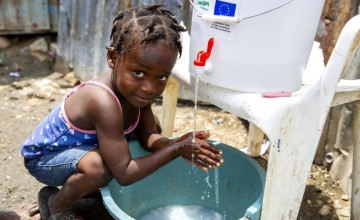
Read our 2023 annual report

Knowledge Hub
Concern warns of impact of COVID-19 surge in world’s poorest countries

Ireland’s largest international humanitarian organisation has expressed concern about a sharp rise in COVID-19 cases and deaths in the world’s poorest countries where it works – as new waves of the virus wreak havoc.
Concern Worldwide said confirmed COVID-19 cases have surged by over 1.9 million, or 45 per cent, to 6.3 million since the start of the year in the 24 countries where Concern operates, which includes Syria, Lebanon, Somalia and Kenya.
Deaths from COVID have also increased by 26,125, or 42 per cent, to 88,750 between January 1 and March 29 - with one country, Malawi, seeing deaths rise by 489 per cent.
The humanitarian organisation has been helping to prevent the spread of the virus since the start of the pandemic in its countries of operation through public messaging about good hygiene, wearing masks and socially distancing.
Masks and soap
It is also providing masks, clean water and soap in extremely poor villages and is helping provide healthcare training and equipment, such as medical oxygen, in countries like Malawi.
After experiencing a low number of cases in 2020, many countries in Africa have since seen them rise sharply after Christmas. This is similar to Ireland where cases increased by 155 per cent between January 1 and March 29 – while deaths surged by 108 per cent in the same period.
“Over the past year, we have reached millions of people through our COVID-19 prevention messaging campaigns, which includes radio broadcasting and vehicle-mounted loudspeaker amplification in some of the most remote areas,” said Concern’s International Programme Director, Carol Morgan, who leads the organisation’s overseas operations.
“However, more aggressive variants are now resulting in a much faster spread of the virus in many places, similar to what we saw in Ireland at the beginning of this year. It is very concerning that the number of COVID-19 cases and deaths are rising significantly in countries that already have very fragile health systems and where ventilators and other medical equipment are also scarce.”
New variant
It is suspected that most of the new cases in countries like Malawi are the South African variant, which is spreading throughout the southern part of the continent much faster than the original coronavirus.
“In addition to new waves of the virus, we have also seen a sharp rise in levels of food insecurity, particularly in many countries that continue to experience conflict. 34 million people are now grappling with emergency levels of acute hunger and we know that is the women and young children who are experiencing the brunt of this.
“Other major crises continue, like the sobering situation in Cox’s Bazar, Bangladesh where almost a million Rohingya refugees remain in limbo and where thousands suffered from recent fires in the makeshift camps.
“We are also responding to a new outbreak of the highly contagious Ebola virus in the Democratic Republic of Congo.
Vaccines
“While vaccines are now becoming available, it is essential that we put all healthcare workers and elderly and vulnerable people at the top of the queue, irrespective of where they are in the world. This would be a more equal system that will benefit all of us across the world.”
In Syria, where Concern continues to support people displaced by war, cases rose by 61 per cent and deaths by 74 per cent since the start of the year.
Lebanon, which hosts 1.7 million Syrian refugees, saw cases rise by 154 per cent, during the first three months of this year with deaths up by 318 per cent.
There have also been huge rises in cases in Iraq (40 per cent), Somalia (130 per cent), Rwanda (155 per cent) and South Sudan (182 per cent) since the year began.
For more information or interview requests, please contact Eamon Timmins, Media Relations Manager, at 087 9880524 or [email protected]
Note to the Editor:
Figures in the above story are a comparison between case and death figures (taken from the World Health Organisation website) between January 1 and March 29, 2021.
Other ways to help
Corporate support
Is your company interested in working together for a common cause?
Fundraise for Concern
From mountain trekking to marathon running, cake sales to table quizzes, there are lots of ways you can support our work.
Buy a gift
With an extensive range of alternative gifts, we have something to suit everybody.
Leave a gift in your will
Leave the world a better place with a life-changing legacy.
Volunteer with Concern
The lots of ways to get involved with our work as a volunteer
School fundraising
Without the generous support from schools, we wouldn't be able to do the work that we do.

